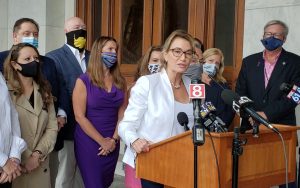By Paul Hughes, Republican-American

HARTFORD — Gov. Ned Lamont said Wednesday that he sees no reason to share emergency powers in the COVID-19 crisis with the legislature.
Meanwhile, House Republicans continued to demand a power-sharing arrangement Wednesday, and push majority Democrats to debate the governor’s extension of his joint declarations of public health and civil preparedness emergencies to Feb. 9.
“This is about our democracy and our representative form of government. Our constituents write to us on a daily basis and want to know when their voices will be directly heard,” said Rep. William Petit, R-Plainville, the ranking House Republican on the Public Health Committee and a doctor.
Lamont said while he remains willing to hear legislators out, he believes having the 151 members of the House and the 36 members of the Senate vote on every emergency coronavirus measure is neither advisable nor workable.
“I think the process has worked pretty well,” he said. “If you think I’m opening schools too fast, if you think I’m opening bars too slowly, if you have particular items you feel very strongly about, come and see me, and, you know, we can talk and get your point out of view, but having everything up to the vote of (187) people would not be the way to go.”
STATE LAW AUTHORIZES the governor to modify and suspend state laws through executive order in declared public health and civil preparedness emergencies.
Lamont has issued 67 orders and counting since he issued emergency declarations on March 10, and he signed new proclamations extending the public health and civil preparedness emergencies for five months on Tuesday because the current ones expire next Wednesday.
House Minority Leader Themis Klarides, R-Derby, urged Democratic leaders again on Wednesday to convene two select committees to at least debate the new emergency declarations before a Friday deadline. She and Senate Minority Leader Leonard A. Fasano, R-North Haven, requested the meetings Tuesday.
“If I believe in something I’m going to defend it, right? If they believe in this, they should defend it. They should put it on the record,” Klarides said. “They should let us take our position and defend our position so the public knows about it.”
State law gives the two select committees 72 hours from when a public health emergency or a civil preparedness emergency is declared to vote to nullify such declarations.
Senate President Martin M. Looney, D-New Haven, said there are no plans to convene the select committees.
“At this point, it is not anticipated,” he said.
State law authorizes a select committee of the four Democratic and the two Republican caucus leaders to vote down a declaration of a civil preparedness emergency.
The statue on public health emergencies gives the same authority to a select committee of the six top caucus leaders, plus the four House and Senate leaders of the Public Health Committee.
While Republicans leaders could force meetings of the select committees, Klarides said it would be pointless to have only the Republicans show up, but she left open the possibility.
The two committees convened in March, but took no action on either of the governor’s declaration. The meetings were more of a show of solidarity in the onset of the COVID-19 pandemic in Connecticut.
DEMOCRATIC AND REPUBLICAN LEADERS traded accusations over each other’s political motivations in this debate over Lamont’s emergency powers.
Klarides and Deputy House Minority Leader Vincent Candelora said Democrats are deferring to Lamont because they want to avoid responsibility for unpopular actions heading into the Nov. 3 general elections.
“When we talk about who is playing politics, I would suggest the Democrat Party right now is trying to play it safe for election time, and now is not the time to play it safe,” said Candelora, R-North Branford. “We have an obligation to our constituency to make the tough decisions, and they don’t want to.”
Looney and House Speaker Joe Aresimowicz, D-Berlin, dismissed the GOP accusation as posturing and bluster.
“I think that is a page out of the playbook of a frustrated Republican minority, which is what they are now,” Looney said.
Aresimowicz said House Republicans are pandering to what he called the ultra-right who would compromise public health and safety in Connecticut.
NAUGATUCK VOTERS are telling Rep. Rosa Rembibas, R-Naugatuck, that they object to Lamont wielding so much unilateral power in the COVID-19 outbreak.
“They want their voices heard, and clearly if the governor is running the show and doing everything by executive order their voices are not being heard,” she said. “So, they wanted their elected official up here debating the issues. We have a lot of businesses in town that are struggling.”
Aresimowicz and Looney said the legislature is not set up to respond as nimbly to the public health crisis.
“The reality is that the legislature is a deliberative body with committees, hearings and protracted debate, and is not built or suited for managing a crisis that demands multiple decisions on a daily basis — it is the role of the executive branch to run the agencies and day to day operations,” Aresimowicz said.
Lamont made the same argument.
“Right now, I think we are led by science. You’ve heard me say that now about a million times. I welcome everybody’s input, but rather than make it into a more of a political process I think what I’d love to do is lead with the science, and keep the legislature involved closely all along the way,” he said.
Klarides and Candelora disputed that Lamont has consulted and collaborated as much as he makes out.
“We realize we are still in a public health emergency, but, unfortunately, his executive orders are too broad,” Klarides said. “They cover health issues, they cover economic issues, they cover election issues, and so by extending these orders in this broad fashion we are allowing the governor to make unilateral decisions by fiat, and that’s the problem.”













